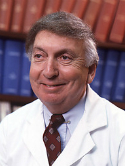Fecal diglycerides as selective endogenous mitogens for premalignant and malignant human colonic epithelial cells Journal Article
| Authors: | Friedman, E.; Isaksson, P.; Rafter, J.; Marian, B.; Winawer, S.; Newmark, H. |
| Article Title: | Fecal diglycerides as selective endogenous mitogens for premalignant and malignant human colonic epithelial cells |
| Abstract: | Diglycerides (DGs) have been found in fecal extracts at concentrations which induce mitogenesis of adenoma and some carcinoma cells but not normal cells in primary culture. DGs containing stearic, oleic, palmitic, and myristic acid side chains were found in fecal extracts from each of eight subjects. Synthetic 1,2-DGs, containing the fatty acids found in endogenous fecal DGs, induced mitogenesis in cultures of premalignant cells from each of 13 adenomas, covering all histological classes, and in cultures from two of four carcinomas. The potent adenoma mitogen, dimyristin, had no mitogenic activity on cultures of normal colonic epithelial cells from seven different subjects. These results suggest DGs may act as endogenous mitogens in the development of human colon cancer. The extent of adenoma mitogenesis was correlated with the chain length of the saturated R-groups: 16 > 14 > 12 > 10 > 8 >>> 18. DGs with oleic acid residues, C18:1, were among the most active, while substitution of even one fatty acid residue with a stearic acid residue, C18:0, reduced or eliminated mitogenic activity. Dimyristin also induced enhanced levels of urokinase secretion from carcinoma cells, in parallel to the phorbol ester tumor promoter, 12-O-tetradecanoylphorbol-13-acetate. These results imply that DGs found in the colon induce a selective growth of benign colonic tumors and some carcinomas, and may enhance the invasive capacity of carcinomas, while leaving normal cells unaffected. © 1989, American Association for Cancer Research. All rights reserved. |
| Keywords: | human cell; comparative study; mitosis; colonic neoplasms; adenoma; cell culture; histochemistry; epithelium; tumor growth; colon carcinoma; feces; colon; diacylglycerol; diglycerides; mitogenic agent; precancerous conditions; tetradecanoylphorbol acetate; colon adenoma; human; priority journal; support, non-u.s. gov't; stearic acids; glycerides |
| Journal Title: | Cancer Research |
| Volume: | 49 |
| Issue: | 3 |
| ISSN: | 0008-5472 |
| Publisher: | American Association for Cancer Research |
| Date Published: | 1989-02-01 |
| Start Page: | 544 |
| End Page: | 548 |
| Language: | English |
| PUBMED: | 2910475 |
| PROVIDER: | scopus |
| DOI/URL: | |
| Notes: | Article -- Export Date: 14 April 2020 -- Brigitte Marion's last name is misspelled on the original publication -- Source: Scopus |
Citation Impact
Related MSK Work





